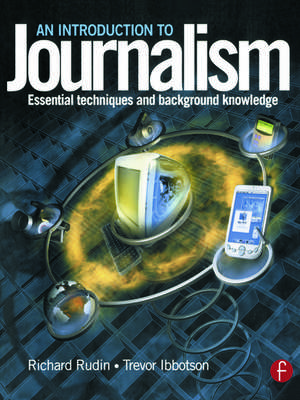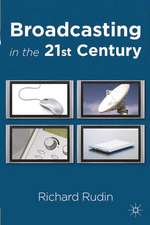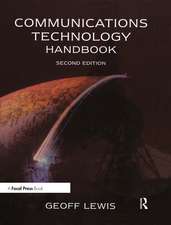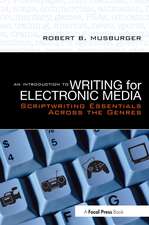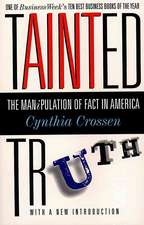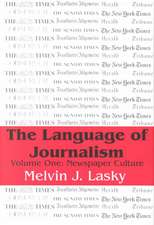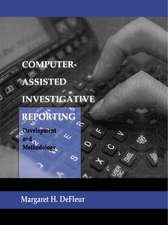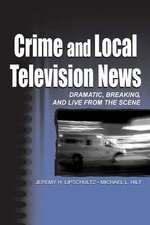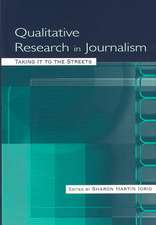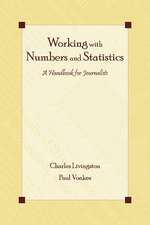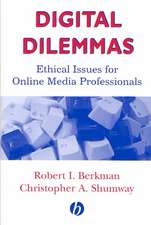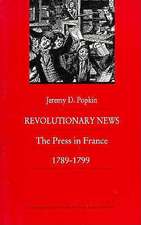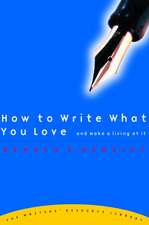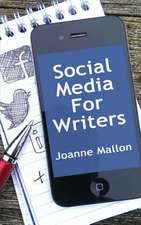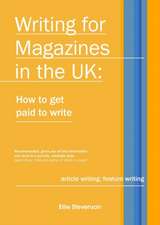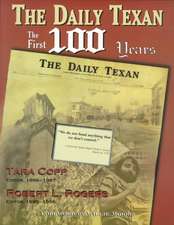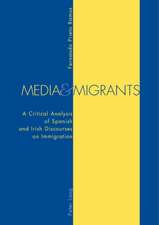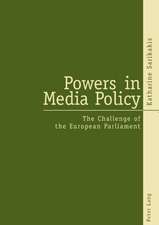Introduction to Journalism: Essential techniques and background knowledge
Autor Richard Rudin, Trevor Ibbotsonen Limba Engleză Paperback – 19 apr 2002
Each chapter concludes with suggested learning activities and an extensive list of resources for further study and investigation. The approach throughout chapters covering background issues (e.g. law) is 'journalism centred': all topics are related to the interests and concerns of journalists and journalism.
Students of the City and Guilds Diploma in Media Techniques will find the book particularly relevant to their studies as it has been developed to reflect the syllabus of this course.
| Toate formatele și edițiile | Preț | Express |
|---|---|---|
| Paperback (1) | 344.05 lei 3-5 săpt. | +31.72 lei 7-13 zile |
| Taylor & Francis – 19 apr 2002 | 344.05 lei 3-5 săpt. | +31.72 lei 7-13 zile |
| Hardback (1) | 1000.27 lei 6-8 săpt. | |
| Taylor & Francis – 28 oct 2015 | 1000.27 lei 6-8 săpt. |
Preț: 344.05 lei
Nou
Puncte Express: 516
Preț estimativ în valută:
65.83€ • 68.88$ • 54.69£
65.83€ • 68.88$ • 54.69£
Carte disponibilă
Livrare economică 12-26 martie
Livrare express 26 februarie-04 martie pentru 41.71 lei
Preluare comenzi: 021 569.72.76
Specificații
ISBN-13: 9780240516349
ISBN-10: 0240516346
Pagini: 364
Ilustrații: 1, black & white illustrations
Dimensiuni: 189 x 246 x 23 mm
Greutate: 0.69 kg
Ediția:1
Editura: Taylor & Francis
Colecția Routledge
Locul publicării:Oxford, United Kingdom
ISBN-10: 0240516346
Pagini: 364
Ilustrații: 1, black & white illustrations
Dimensiuni: 189 x 246 x 23 mm
Greutate: 0.69 kg
Ediția:1
Editura: Taylor & Francis
Colecția Routledge
Locul publicării:Oxford, United Kingdom
Public țintă
Students of the following journalism courses: the new City and Guilds level 3 diploma in media techniques, Edexcel (BTEC) media, GNVQ media (advanced), NVQ newspaper/periodical, Open College Network, HND, NCTJ (Pre-entry/NCE) and BJTC courses. Also students studying journalism as part of a University diploma or degree.Cuprins
Background and issues; History and development; Researching and recording information; Newspapers and magazines; Print layout and production; Online journalism; Radio; Television; Freelance Journalism; Health and safety; Central Government; Devolved and local government; Journalism law; Media regulatory bodies; Careers and training
Recenzii
"I am frequently asked by a variety of people for advice about getting into journalism. In future I shall refer them to this book. Of course it does not assure its readers that they'll find a job in the profession but it's one of the most comprehensive and practical books about the trade. Even for people in the business of journalism I think it's an essential aid. It is beautifully done and extremely thorough."
Sir Trevor McDonald, OBE, presenter of the ITV News at Ten
"A great starting point for anyone thinking of a career in journalism. The background knowledge is particularly useful in spelling out the huge range of things a journalist has to know - not just beginners either - the section on law is the best summary I've seen of the implications of some fairly obscure recent legislation for journalists."
Jim Latham, BJTC
"An excellent basic textbook for would-be journalists."
Professor Ivor Gaber, The Times Higher Educational Supplement
"I am hoping to have a career in journalism and the book has been wonderful - commonly now referred to as 'my bible'! It has balance - it is not a struggle to read or a bore with information and detail that will leave you dumbstruck, but instead covers points well and will not leave any questions or confusion... I sat my exam today [for City and Guilds Radio and Press] and although I found it challenging it would have been impossible without 'the Bible - An Introduction to Journalism'."
City & Guilds Student, Kate Richards - Amazon.co.uk
"'An Introduction to Journalism' contains a heady mix of the historical; the practical; the legal and the ethical and I cannot recommend it highly enough to aspiring journalists. It is also written in an extremely engaging way, which is not how I remember my academic books. As a former BBC senior editor, I found this book provides both valuable information for newcomers and useful reference material for old hands. The level of detail is impressive, especially given that it's trying to appeal to every type of journalist from the newspaper writer to the web producer. And that is also its strength, in that it allows the reader to view the industry from all sides. With a useful mix of real-life examples of good working practice - including guidance on how to sit and breathe properly before a radio broadcast - and posing serious questions in the practical exercises after each chapter, this is not lightweight stuff. The authors have gained a wealth of experience between them in journalism and they have assembled their knowledge and put it into context, and, in doing so, have displayed an all-too evident passion for the industry both have spent their working lives in."
Roy Saatchi, Former BBC Senior Editor
"The book can be thoroughly recommended as a first-rate comprehensive textbook for all those students of journalism who take their vocational training and education seriously enough to emulate "best practice'."
Desmond Smith,
Senior Lecturer in Journalism
"An Introduction to Journalism is solid and useful, an expert hand which clasps the student's, and is generously held out to the teacher, too."
David Lancaster, in the Journal of European Area Studies
Sir Trevor McDonald, OBE, presenter of the ITV News at Ten
"A great starting point for anyone thinking of a career in journalism. The background knowledge is particularly useful in spelling out the huge range of things a journalist has to know - not just beginners either - the section on law is the best summary I've seen of the implications of some fairly obscure recent legislation for journalists."
Jim Latham, BJTC
"An excellent basic textbook for would-be journalists."
Professor Ivor Gaber, The Times Higher Educational Supplement
"I am hoping to have a career in journalism and the book has been wonderful - commonly now referred to as 'my bible'! It has balance - it is not a struggle to read or a bore with information and detail that will leave you dumbstruck, but instead covers points well and will not leave any questions or confusion... I sat my exam today [for City and Guilds Radio and Press] and although I found it challenging it would have been impossible without 'the Bible - An Introduction to Journalism'."
City & Guilds Student, Kate Richards - Amazon.co.uk
"'An Introduction to Journalism' contains a heady mix of the historical; the practical; the legal and the ethical and I cannot recommend it highly enough to aspiring journalists. It is also written in an extremely engaging way, which is not how I remember my academic books. As a former BBC senior editor, I found this book provides both valuable information for newcomers and useful reference material for old hands. The level of detail is impressive, especially given that it's trying to appeal to every type of journalist from the newspaper writer to the web producer. And that is also its strength, in that it allows the reader to view the industry from all sides. With a useful mix of real-life examples of good working practice - including guidance on how to sit and breathe properly before a radio broadcast - and posing serious questions in the practical exercises after each chapter, this is not lightweight stuff. The authors have gained a wealth of experience between them in journalism and they have assembled their knowledge and put it into context, and, in doing so, have displayed an all-too evident passion for the industry both have spent their working lives in."
Roy Saatchi, Former BBC Senior Editor
"The book can be thoroughly recommended as a first-rate comprehensive textbook for all those students of journalism who take their vocational training and education seriously enough to emulate "best practice'."
Desmond Smith,
Senior Lecturer in Journalism
"An Introduction to Journalism is solid and useful, an expert hand which clasps the student's, and is generously held out to the teacher, too."
David Lancaster, in the Journal of European Area Studies
Notă biografică
Richard initially trained and practised as a newspaper journalist through the National Council for the Training of Journalists’ (NCTJ) scheme, on weekly and evening newspapers. He then turned to radio journalism, initially in the commercial sector, reporting on many stories of national importance for Independent Radio News, as well as presenting major news programmes. He gained broader radio, as well as initial television experience, with the British Forces’ Broadcasting Network in Germany. On returning to the UK Richard held senior editorial, production and presentation roles on major BBC and commercial stations, gaining an Open University honours degree and teaching qualification along the way – later adding an M.A. in mass communications from the University of Leicester.His first lecturing and tutoring work was with the City and Guilds Media Techniques Certificate: Journalism and Radio and this led to a full-time post as a journalism lecturer at Liverpool Community College, teaching on City and Guilds, NCTJ, NVQ and postgraduate journalism courses, as well as setting exams in media for BTEC. He then became a senior lecturer in journalism at Liverpool John Moores University, where he teaches a variety of subjects at both undergraduate and postgraduate level. He remains a close observer of, and participant in, journalism and the media, including contributions to BBC Radio 4’s media discussion programme The Message and articles for RADIO Magazine, as well as wide- ranging external examining, consultation and research.Further details at: www.richardrudin.com,
Trevor is an independent media consultant, lecturer, media producer and writer. He is Chief Examiner, Specialist Media Advisor and External Verifier for the City and Guilds Diploma and Certificates in Media Techniques. From 1995 to 2001 he was Chief Examiner for GNVQ Media: Communication and Production for the OCR awarding body. Since 1997 he has been an External Moderator of OCN Schemes in Radio, Journalism and Television for the South of England Open College Network, University of Brighton. He has been closely involved with national curriculum development in vocational media qualifications and has worked extensively as a consultant for QCA and the former NCVQ. In 2001, on behalf of the City and Guilds, he was instrumental in mapping their existing and new vocational media schemes to the occupational standards laid down by Skillset, the National Training Organization for TV, radio, film, video and interactive media and The Publishing National Training Organization for newspaper and periodical journalism. He has over 30 years lecturing experience in further and higher education and has worked on City and Guilds, BTEC, NCTJ, BCTJ and degree-level courses as well as organizing and delivering short training courses in communication skills and media production. Trevor is keenly interested in community service broadcasting and has contributed to RSLs such as ETFM and Tube Radio at Thames Valley University, as well as delivering radio training for Horizon ‘On Air’ Transnational Refugee Projects in West London. In 2001, in conjunction with CSV Training Wales, he helped set up City and Guilds validation and assessment for Gem TV, part of the Gemini Trust, which is training young people in television production in Ethiopia.
Trevor is an independent media consultant, lecturer, media producer and writer. He is Chief Examiner, Specialist Media Advisor and External Verifier for the City and Guilds Diploma and Certificates in Media Techniques. From 1995 to 2001 he was Chief Examiner for GNVQ Media: Communication and Production for the OCR awarding body. Since 1997 he has been an External Moderator of OCN Schemes in Radio, Journalism and Television for the South of England Open College Network, University of Brighton. He has been closely involved with national curriculum development in vocational media qualifications and has worked extensively as a consultant for QCA and the former NCVQ. In 2001, on behalf of the City and Guilds, he was instrumental in mapping their existing and new vocational media schemes to the occupational standards laid down by Skillset, the National Training Organization for TV, radio, film, video and interactive media and The Publishing National Training Organization for newspaper and periodical journalism. He has over 30 years lecturing experience in further and higher education and has worked on City and Guilds, BTEC, NCTJ, BCTJ and degree-level courses as well as organizing and delivering short training courses in communication skills and media production. Trevor is keenly interested in community service broadcasting and has contributed to RSLs such as ETFM and Tube Radio at Thames Valley University, as well as delivering radio training for Horizon ‘On Air’ Transnational Refugee Projects in West London. In 2001, in conjunction with CSV Training Wales, he helped set up City and Guilds validation and assessment for Gem TV, part of the Gemini Trust, which is training young people in television production in Ethiopia.
